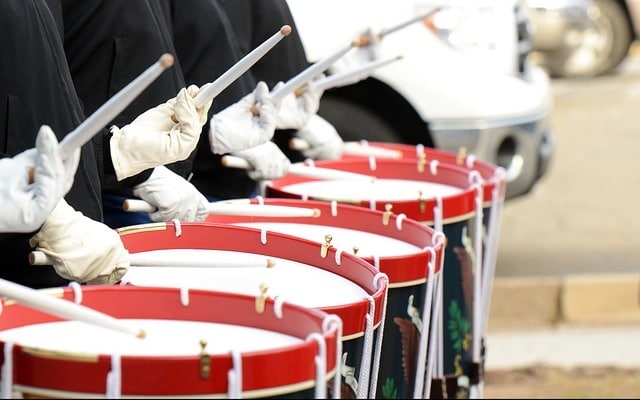The drummer – the person that transforms a good band into a great band, a powerhouse of passion and stamina that keeps the rest of the band in sync and in the groove during marathon performances, and an exhibition of the skill of coordination, control, and rhythm. In spite of guitarists hogging limelight, drummers continue to thrive in a niche of their own.

Apart from the freedom of musical expression with a seasoning of ferocity and force, a drummer has a lot to gain from his passion for the beat. Scientists and researchers vouch for drumming as a therapy. Not only does drumming help anyone blow off steam and showcase creative energy outbursts, but also goes a long way in strengthening the immune system of the drummer. That’s just the tip of the iceberg; here are some research works that say a lot about drumming:
In 2008, University of Gloucester collaborated with University of Chichester on a study that documented the benefits of drumming in enhancing physical strength and fitness.
E. Glenn Shallenberg, from University of Toronto, showcased how 6 year old children scored better at IQ tests after receiving lessons in playing drums.
A 2008 article from BBC compared drummers with athletes!
Let’s give you some more irresistible reasons that’ll coax you into motivating your children to take drumming lessons.
The Healing Power of Drums

For several years, scientists and researchers have studied drummers, and conducted experiments on people from different age groups after having them undergo training in drumming. All the research literature indicates that drumming can be a blessing of wonderful health for your child.
Beat Away Stress and Anxiety
Your child will enjoy his childhood and academic career better with a potent remedy for keeping stress and anxiety at bay – that’s his drum and drumsticks. Researchers from the Stanford University School of Medicine enrolled 30 people suffering from depression in music therapy classes, and observed that all of them were less depressed after they learnt and practiced simple rhythms on the drums.
The Healing Touch of Drums – Improved Immune System
Medical studies have showcased the effectiveness of drumming as a means of improving the immune system of the body. A study conducted by Dr. Bittman demonstrated how group drumming helped participants increase their cancer-killing cell counts. Group drumming enabled participants to resist the ravages of cancer and AIDS, apart from improving their immunity against other diseases. Dr. Bittman’s study is among the most credible works showcasing the effectiveness of drumming as a healing power.
In Pain? Drum Your Way Out of It
Drumming is known to catalyze the production of endogenous opiates and endorphins, which help reduce the sensation of pain, just like morphine. This makes drumming a potent therapy for pain reduction, particularly useful to overcome chronic pains. The assertion was scientifically explored and vetted in a study titled “Shamanism: The Neural Ecology of Consciousness and Healing”, authored by Michael Winkelman.
An Outlet of Expression, A Ticket to All Musical Congregations
Imagine being able to hit something, and create music in the process! Drums are among the few musical instruments that help children express their rough side, in a constructive manner! Plus, because of the versatility of drums, children who wish to learn the same can fit into all kinds of musical settings.
With their drumming training, your children can become a part of the school rock band, the neighborhood jazz club, and even the town’s concert band. Expect your kid to enjoy being a part of the marching band in the school, once he’s exposed to the world of drumming. So, think big, think out of the box, and expose your kid to the wonders of plating drums.

Drumming as a Mental Workout
Drumming involves all areas of the human brain – the auditory cortexes, the motor cortexes, and the corpus callosum, to name a few. Plus, your child uses both his hands and both his feet simultaneously to create some musical magic with the drums.
Drumming engages the right as well as the left hemispheres of the brain, slowing the brain waves to 8 cycles every second, which is precisely what the earth’s frequency is! Fast drumming requires the brain to operate at top levels of concentration and coordination, whereas slow rhythmic drumming also demands high degree of control from the brain. Studies indicate that kids who practice drumming have higher IQs than their untrained counterparts.
Featured Image: Image Credit
Top 10 Lars Ulrich Drumming Moments.#funnymoments Yeah, That’s Right… 😀https://t.co/YqRTxDBGiE
— Lars Ulrich (@Iarsulrich) March 10, 2016
Drumming synchronizes left and right brain hemispheres and increases alpha brain waves… #sacred_dr https://t.co/EFD4rGVocW
— DNM RECORDS (@DNMRECORDS) March 7, 2016
Related Articles:
The Top 10 Benefits of Learning Drums
There are several great reasons for both adults and children to learn drums. So if you’re on the fence about signing up for drum lessons, take a look at what the research says. Here, Philadelphia, PA teacher Andrea I. shares the top 10 benefits of learning drums…
1. Reduce Stress
Playing drums can relieve frustration, disappointment, and stress. Whether you’re behind a drum kit, hitting a djembe in a drum circle, or beating a marching band bass drum, drumming is a stress reliever. Playing drums, even for just a few minutes, can boost your mood. Via Take Lessons
Best Reasons Why Parent Should Encourage Drum Lessons For Kids
Whenever parents consider enrolling their children for music classes, playing the drums is hardly ever the top choice. Drums are often characterized as musical instruments played by teenagers and adults. Hence, drum lessons for kids was quite unheard of back in the day.
However, music experts and child development researchers have proven this perception wrong. Playing the drums is not for adults only. In fact, studies and actual children have shown that as early as ages 5 to 8 years old, a child is capable of learning to play the drums.
Here are top reasons how your child could benefit from drum lessons even at an early age. Via Drum Lessons Singapore
What are the Benefits of Learning Rhythm Through Drumming??
A classroom full of students sits in a circle playing a variety of drums, shakers, sticks, and other percussion instruments. They are singing rhythms about an alligator. The teacher suddenly plays a rhythm on the drum and everyone simultaneously shouts out “yeah!” as they hit their drums one last time. “Now, let’s start from the beginning and play all four rhythms in a row. Can we do it?” “Yes!” shout the students, eager to be chosen as the drum leader. Surprisingly, this is not just a group of children making noise! It may be hard to imagine that the simple act of playing a drum could bring enormous benefits. However, the fact is that a rhythmic art class, like the Rhythm Kids class described above, contributes positively and significantly to the social-emotional development of children. Let’s explore some of the most important benefits. Via Groovy Baby Music

